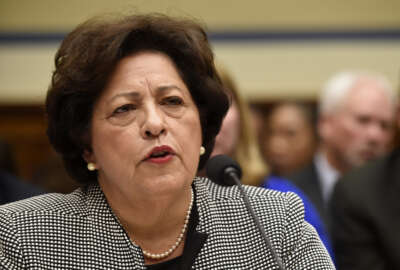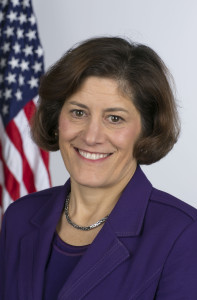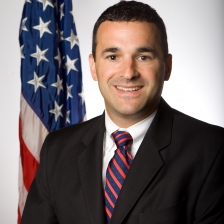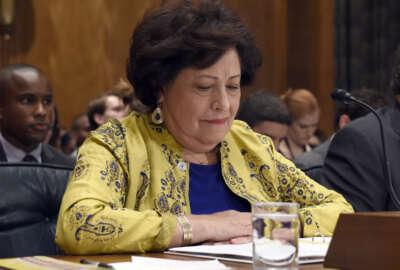
OPM’s Beth Cobert can learn from former IRS scandal
Danny Werfel, the former acting IRS commissioner, sheds light on the challenges Beth Cobert, the new acting director of the Office of Personnel Management, will...
It’ll be a tough road ahead for the next director of the Office of Personnel Management after Katherine Archuleta resigned. That person will enter an agency trying to recover from the biggest known breach of federal employee data in history.
In the meantime, Beth Cobert, the former deputy director for management at the Office of Management and Budget, has stepped in as the acting OPM director.

“Beth and I were experiencing similar paths,” Danny Werfel, director in the Public Sector practice at The Boston Consulting Group, told Emily Kopp Monday on Federal Drive. Werfel was brought in to lead the Internal Revenue Service in 2013 after its commissioner stepped down due to a series of scandals. Prior to that, he was the OMB controller.
“Like me, Beth is in the mix there in and around the President’s top advisers, demonstrating her expertise in public sector management,” he said. “And so, as these issues start to arise and there’s a real need to infuse new leadership and leadership that the White House has a high-degree of confidence, can get the job done, leaders in and around the Office of Management and Budget kind of emerge as great candidates.”
Werfel added that it’s a healthy thing for someone at OMB to step up and lead an agency in trouble.
Werfel came to IRS in the aftermath of a scandal involving a single office accused of targeting tax-exempt conservative groups. By comparison, Cobert is coming to an agency reeling from two cyber breaches that impacted millions of current and former federal employees. On top of that, the second breach, which involved the exposure of information from security clearance applications, has national security implications.
These seem like two very different situations, but Werfel said they have a number of similarities.
“You have an organization that’s in a crisis,” he said. “There’s a major, major, major problem that needs to be fixed immediately, but also, the incoming acting director has to manage the rest of the organization as well. So, there’s a need to fix the problem at hand. There’s also a need to run the other mission-critical activities of the organization and make sure the agency is moving forward. … There are morale challenges at both organizations.”
Based on his own experiences at IRS, Werfel has two recommendations for someone coming into a situation like this. First, rely on the team that’s already in place.
“Early on, embrace the expertise of the civil servant leadership that’s there,” he said. “In every federal organization, there is really top-notch talent with a passion and a desire to improve and drive better results. They’re going to be a huge resource for Beth inside of OPM.”
Second, the new leader has to bring in new perspectives from the public sector and other government agencies.

“By infusing the agency with new perspectives and new talent, it was absolutely critical to help me with the leadership path that we spelled out for the organization,” he said.
Some might think that OPM’s problems are over, now that Archuleta has resigned. Werfel disagreed. There are many stakeholders that Cobert is going to have to answer to, including OPM employees, the public and Congress, who want the agency to move forward and succeed.
“There are some common things that Beth can do as leader to really address stakeholder concerns,” Werfel said. “One of them is to make sure she’s quickly and rapidly diagnosing the problem that occurred. Putting in very specific and aggressive, corrective actions to address that problem. But also, looking more broadly at OPM as an organization at its IT security and putting in those medium and long-term changes as well. By doing that, she’s going to hit a lot different concerns from these various stakeholders.”
Kettl said that OPM’s situation is more challenging than what IRS faced, partly because the agency hasn’t had a deputy director for some time, but also because Cobert faces several challenges that need to be addressed quickly.
“There needs to be an effort to try to get a handle on the nature of the data breach, an improvement in the way that’s communicated out to federal employees, who, in many cases, are very worried about whether they’re included or not and what, if anything, they ought to do about it,” he said.
OPM also needs to figure out a way to shore up its databases to ensure a new breach doesn’t occur.
“One of the things that’s often overlooked is that OPM has a large constellation of separate and quasi-integrated databases out there,” Kettl said. “Those need to be set up, created, protected and safeguarded as time goes by, and that’s an essential piece.”
On top of all this, OPM still has to meet its mission of serving the human capital needs of federal government.
“It’s clear that that’s been a serious weakness for some time now, and the acting director or permanent director is going to need to put serious attention to the need to figure out how the right people can be hired for the right jobs at the right places at the right times,” Kettl said. “And that’s something that has been a growing problem in OPM, and because there’s a problem at OPM, for the rest of the government as well. Not only does attention have to be paid to the data breach, but much more attention has to be paid to this basic, strategic human capital problem and that’s a one-two punch that Beth Cobert now faces as she takes the helm at OPM.”
Read all of Federal News Radio’s coverage of the OPM Cyber Breach.
Copyright © 2025 Federal News Network. All rights reserved. This website is not intended for users located within the European Economic Area.
Michael O’Connell is senior digital editor of Federal News Network optimizing content for the best user experience. Follow @moconnellWFED
Follow @moconnellWFED




